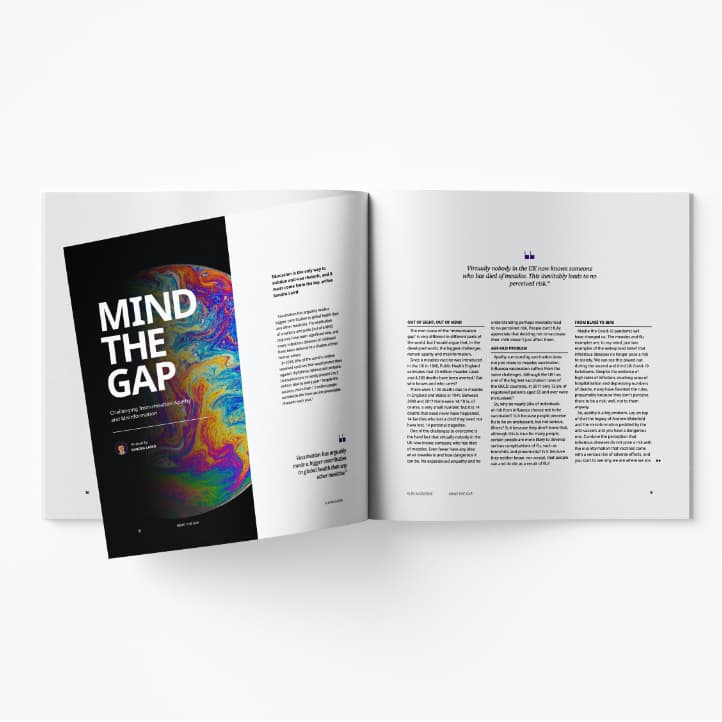
What do we really value as a society?

It would take a hard heart not to have been moved by the sight of Captain Sir Tom doing his 100 laps of the garden, raising close to £40 million for the NHS, and then going on to reach his 100th birthday.
We all aspire to live well and live long. Babies born since the year 2000 can expect to live to be 100.1 But we won’t all get that telegram from the Queen, let alone a knighthood, and good mental and physical health is far from a certainty in old age.
Yes, improvements in healthcare and a plethora of Nobel-worthy drug discoveries in the past century are to be applauded as having contributed to people living longer and healthier lives. Yet there has been a cost. For every sprightly 73-year-old still dazzling on the tennis court or nailing it in the boardroom, there are many more ‘elderly’ living with chronic diseases, frailty and poor mental health.
Take dementia. The numbers and the stats are numbing.
By 2050 the number of people in the world living with dementia is projected to triple, relative to numbers reported in 2015.2,3 Dementia has been described as “the greatest global challenge for health and social care in the 21st century”.2,3
Extra years – stolen away
In April 2021, Covid-19 stopped being the leading cause of death in England. Dementia is now ‘higher up the charts’ – back to claiming more lives than Covid-19 according to the latest ONS monthly figures.
A third of older people in our society die with dementia. A third.3
“A third of older people in our society die with dementia. A third.”
As with any condition – the number of deaths provides just a snapshot of the burden of disease, not to mention the impact.
Nearly a million people in the UK are thought to be living with dementia but there are currently no life-changing treatments for the condition. To summarise the (largely unsuccessful) quest of recent years to find effective treatments for dementia would require a whole other article. The Lancet Commission on Dementia Prevention, Intervention and Care2,3 does that job better than I can in that regard, and their papers should be a compulsory read for anyone with even a passing interest in public health.
Dementias gradually rob an individual of their abilities, and along the way impact on the family, friends and supporters of the affected person.
The global cost and impact of dementia
Nearly 85% of the staggering US$818 billion global costs of dementia (2015) are related to family and social, rather than medical care.3 Anecdotally, I have a friend whose parents are now both in a care home: one needs round-the-clock care due to general frailty of old age, the other due to dementia. Happily, they still get to live together as a couple, but it costs £10k a month for that care. I don’t deny that that’s a fair cost and my friend’s family are happy to meet it, but you do the maths. Selling the family home will only cover care for a limited period.
Priceless priorities
So, what do we value as a society when it comes to our ageing population and fixing our priorities for medical research and therapeutic endeavour?
Are we happy to congratulate ourselves that people are living longer and smile at the shining examples of fit and healthy ‘seniors’? To hope that when we reach old age we’ll be one of the lucky ones, and somehow, magically, there will be new medicines and better social care structures to let us reap the rewards of retirement?
Alzheimer’s Research UK – our chosen charity at Dice for 2021 – knows that the road to breakthrough medicines requires committed investment in both basic and applied research. Our own industry knows that the past 20 years have seen many more failures than successes in the search to find new targets and new drugs that might help slow, prevent and manage the myriad aspects of dementias.
Prevention, prevention, prevention
It’s not all doom and gloom; we can be ambitious about prevention. Like so many non-communicable diseases, there is evidence that addressing risk factors has the potential to delay or prevent disease. Early, preventive measures during life could reduce dementia cases by around 40%.2,3 The usual suspects come to the fore: exercise more, reduce/don’t smoke, manage and control hypertension, obesity and diabetes across a lifetime.
Education in early life matters too, as does social contact throughout life – with each contributing to our ‘cognitive reserve’ for later life.2,3
Three new modifiable risk factors have just been added to the list of things that are causally linked with dementias:3 excessive alcohol consumption, head injury and air pollution.
Recent research shows that getting the right amount of sleep in middle and old age is also important. That one is a bit of a “Goldilocks” story: less than six hours a night is bad, and too much sleep is also bad. You’ve got to get it just right.4
“Nearly a million people in the UK are thought to be living with dementia but there are currently no life-changing treatments for the condition.”
Research, research, research
It’s not all doom and gloom on the treatment front either. Much can be done to manage the co-morbidities that come along with old age and affect over 50% of people with dementias.5 Biomarkers for disease and research into early and prodromal syndromes that may signal early signs of Alzheimer’s are fruitful ground for therapeutic research.2,3
We can get there – we’ve seen it with other diseases. It probably won’t be one magic bullet but a mixture of drugs and tailored approaches, not least as ‘dementia’, like ‘cancer’, isn’t just one disease. But if we don’t try and don’t invest, we won’t succeed.
Investment in dementia through Alzheimer’s Research UK
I’ve got a rose-covered cottage earmarked for my old age, but until then I’m off to sign the Alzheimer’s Research UK petition to the UK government to urgently invest in dementia research and set out plans to deliver on a promise to double funding and speed up progress into clinical trials.5 As I write, they are just shy of the 50,000 needed to take their petition to Number 10.
- Christensen K, et al. Ageing populations: the challenges ahead. Lancet 2009;374:1196-208.
- Livingston G, et al. Dementia prevention, intervention, and care: 2020 report of the Lancet Commission. Lancet 2020;396:413-46.
- Livingston G, et al. Dementia prevention, intervention and care. Lancet 2017;390:2673-734.
- Sabia S, et al. Association of sleep duration in middle and old age with incidence of dementia. Nature Communications 2021;12:article 2289.
- Cigolle CT, et al. Geriatric conditions and disability: the Health and Retirement Study. Ann Intern Med 2007;147:156-64.
- https://www.alzheimersresearchuk.org/campaigns/dementia-research-at-risk-petition/






